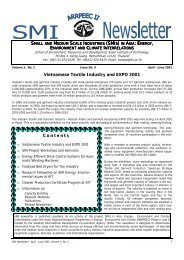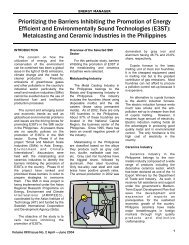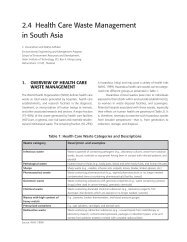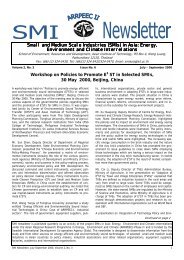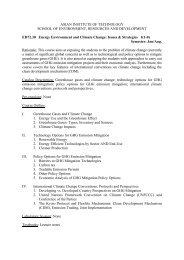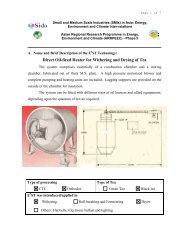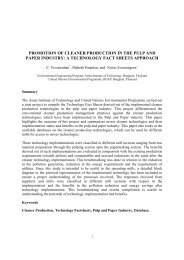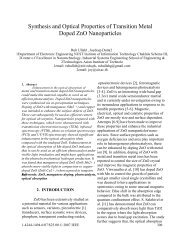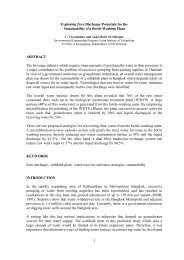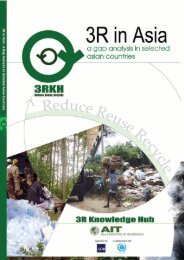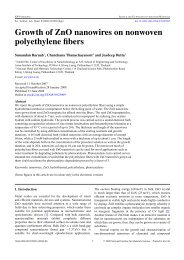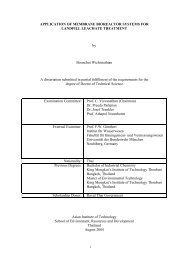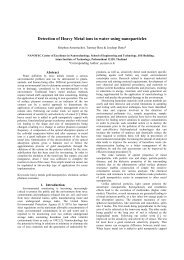Healthcare Waste Report - Environment Health
Healthcare Waste Report - Environment Health
Healthcare Waste Report - Environment Health
Create successful ePaper yourself
Turn your PDF publications into a flip-book with our unique Google optimized e-Paper software.
Box below presents information on healthcare waste treatment, including the cost of treatment in<br />
the Delhi, the capital of India.<br />
Scenario of Biomedical <strong>Waste</strong> in Delhi, India<br />
<strong><strong>Health</strong>care</strong> waste generation in Delhi, the capital of India, is approximately 22.5 tons/day.<br />
Government hospitals and major private hospitals have their own arrangement for treatment of<br />
healthcare waste, often referred as biomedical waste in India.<br />
Biomedical waste generated in 30 Delhi government hospitals vary from, for example, 0.78 kg/<br />
bed/day at Shushruta Trauma Centre to 0.30 kg/bed/day at Guru Nanak Eye Centre and some<br />
other hospitals even much lesser indicating an overall average of 0.26 kg/bed/day. Similarly,<br />
biomedical waste generated in 31 hospitals other than Delhi government vary from, for instance,<br />
0.58 kg/bed/day at the Infectious Disease Hospital to 0.30kg/bed/day at Venu Eye Institute and<br />
Research Centre and much lesser in other hospitals indicating an overall average of 0.20 kg/<br />
bed/day.<br />
In Delhi, biomedical waste management services are offered by Biocare Technological Services<br />
and Synergy <strong>Waste</strong> Management Company in addition to onsite treatment facilities owned by<br />
the hospitals. Some smaller clinics/laboratories do not utilize the services of the operators and<br />
do not posses proper for authorization. At present in Delhi 18 incinerators, 18 autoclaves and 3<br />
microwaves are in operation. Besides this, Synergy <strong>Waste</strong> Management Private Limited<br />
established a treatment facility at Okhla in November 2006.<br />
Under the 10th Five Year Plan, the Delhi Government has established a Biomedical <strong>Waste</strong><br />
Management Cell to monitor biomedical waste management in Delhi. All hospitals under the<br />
Delhi National Capital Territory Government are to have separate budget for Biomedical <strong>Waste</strong><br />
Management.<br />
The cost of biomedical waste treatment varies from Rs. 770/bed/year (USD 17) in Attar Sain<br />
Jain hospital to Rs. 14,000/bed/year (USD 310) in RB Seth Jessa Ram Hospital. The average<br />
cost works to about Rs.5,300/bed/year (USD 117). The average expenditure for institutions<br />
having onsite treatment facility works to about Rs. 7230/bed/year (USD 160) whereas the<br />
institutions using centralized facility are spending only Rs. 2100/bed/year (USD 46), less than<br />
30% of the cost of onsite treatment. However, the level of treatment and the technology utilized<br />
make a difference still implying centralized treatment could be cheaper.<br />
In view of the difficulties faced by private hospitals, nursing homes and clinics, that cannot make<br />
their own arrangements due to high cost involved in treatment facilities, there is a need for<br />
centralized system for treatment. In order to facilitate the proper treatment of the biomedical<br />
waste generated from smaller nursing homes, clinics, blood banks and diagnostic laboratories the<br />
government is taking initiatives to establish centralized waste treatment facilities.<br />
(Source: BWMC, 2006)<br />
113 HEALTHCARE WASTE IN ASIA: INTUITIONS & INSIGHTS




